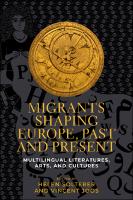Migrants shaping Europe, past and present
Contributor(s)
Solterer, Helen (editor)
Joos, Vincent (editor)
Language
EnglishAbstract
This comparative volume examines the sustained contribution of migrants to Europe’s literatures, social cultures, and arts over centuries. Europe has never been a continent bounded by the seas that surround it. In premodern times, migrants imprinted the languages, arts, and literatures of the places where they settled. They contributed to these cultures and economies. Some were on the move in search of a better life; others were displaced by war, dispossessed, expelled; while still others were brought in servitude to European cities to work, enslaved. Today’s immigration flows in Europe are not exceptional but anchored in this longue durée process. Iberia/Maghreb, Sicily/Lampedusa, Calais are the three hotspots considered in this volume. These regions have been shaped and continue to be shaped by migrants; by their cultures; their Spanish, Arabic, Italian, and Somali; their French, English and Mandarin languages. They are also shaped by migrants’ struggles. The scholars and artists who wrote Migrants shaping Europe, past and present compose a new significant chapter in the cultural history of European migration by reflecting on the forces that have put people into motion since the premodern period and by examining the visual arts, literature, and multilingual social worlds fostered by migration. This historically expansive and multilingual approach to mobility and expressiveness makes a crucial contribution: migrants as a lifeblood of European cultures.
Keywords
Europe; early modern; modern; immigration; multicultural; multilingual; art; literature; colonialismDOI
10.7765/9781526166180ISBN
9781526166180, 9781526166180Publisher
Manchester University PressPublisher website
https://manchesteruniversitypress.co.uk/Publication date and place
Manchester, 2022Classification
Migration, immigration and emigration
Relating to migrant groups / diaspora communities or peoples
European history
History and Archaeology
c 1500 onwards to present day


 Download
Download Web Shop
Web Shop